I’m not a vegetarian. I believe that animals have a place in agriculture and in our diet. Meat raised on pastures and on farms that integrate animals into the whole picture is a sustainable and conscientious food source. On the other hand, meat produced in confined feed lots and in concrete buildings is wrong on many levels. I limit my consumption of such meat, but I’m not a hard-core locavore. If my friend, who makes the best fried chicken in the entire world, invites me over for dinner, I’ll be there in flash (hint, hint, Giuia.) If I’m at a restaurant and the most interesting item on the menu is chicken, I’ll order it. The reality is that the poultry industry is a trillion-dollar, world-wide business. My buying power isn’t going to make even a pin-prick of a dent if I opt out.
On the other hand, my buying power makes a world of difference to the small farmer who is doing animal agriculture right. All of the red meat and pork in my freezer is purchased from local farms. Up until recently the best choice I’ve had for poultry is to buy organic at the regular market. Organic doesn’t necessarily mean that the chickens were uncrowded or out in sunshine, but they are raised better than the regular supermarket birds. Fortunately, now I have a better option than organic. Two young and idealistic people started a farm in my town.
They are raising chickens for meat and eggs. On pasture.
In Massachusetts, a farmer is allowed to raise up to 1,000 chickens to slaughter and sell on the farm. Beyond that number, the birds have to go to a slaughterhouse, where the added fee of processing puts the meat out of the range of most consumers. Yesterday was slaughter day. David, Gallagher and volunteers processed their flock. They set up a tent and their equipment.
It is bloody, messy, and physically demanding work.
These are the killing cones.
It looks gruesome, but at least their birds did not get shoved into crates and shipped. They were handled with care and respect up until the end, and the end was quick.
Then the feathers got removed in this contraption.
Next, the birds were kept in ice water until they were gutted and trimmed. Remaining feathers were plucked.
Because this is a farm with horses, there are large manure piles. Using a tractor, the offal was buried in the compost.
The finished birds were bagged, and then refrigerated or frozen.
I bought three birds. $5 per pound. 4 pounds per chicken. $60. I don’t compare it to what I’d pay at the supermarket. It’s a totally different product. The man taking my money is the man who raised and slaughtered the animals.
This chicken comes from a farm that has a real barn. I’m hoping that my support helps to keep animals on the property, on pasture, and that this barn remains filled with hay and the smell of a working farm for years to come.
We’re going to have roast chicken and new potatoes for Father’s Day dinner. I’ll be thanking the farmers and the animals they raised.
Due to state regulations, Black Brook Farm Growers cannot ship, but if you’re anywhere in the area, you can go on-line to order and then pick up in person. Tell them I sent you.

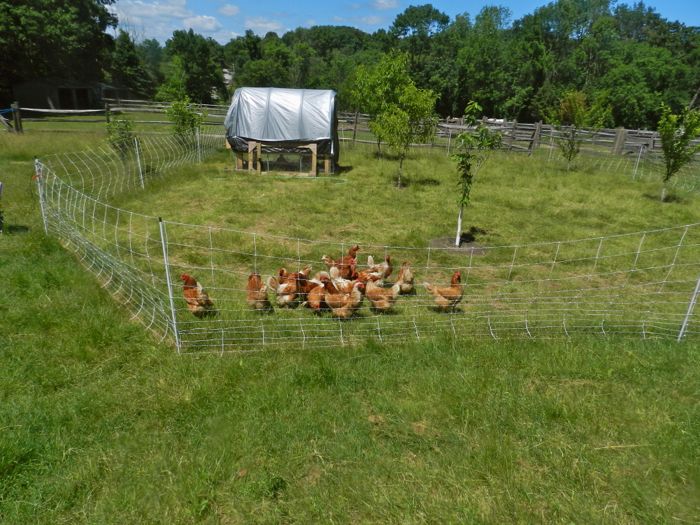
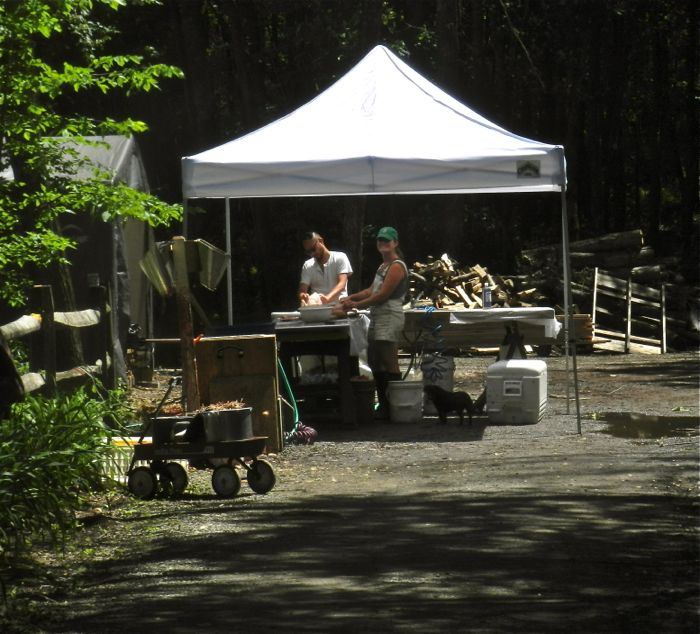
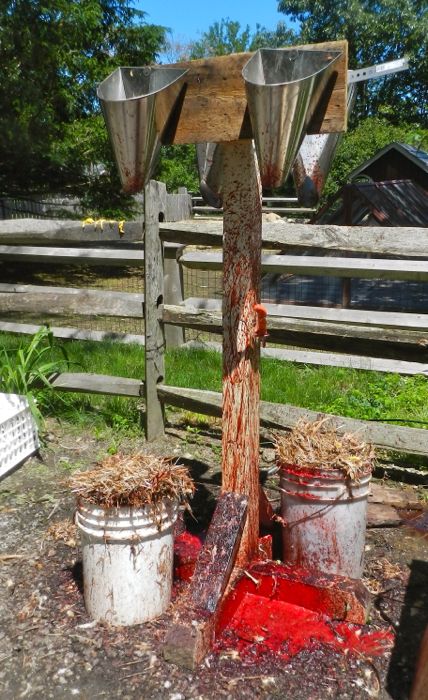
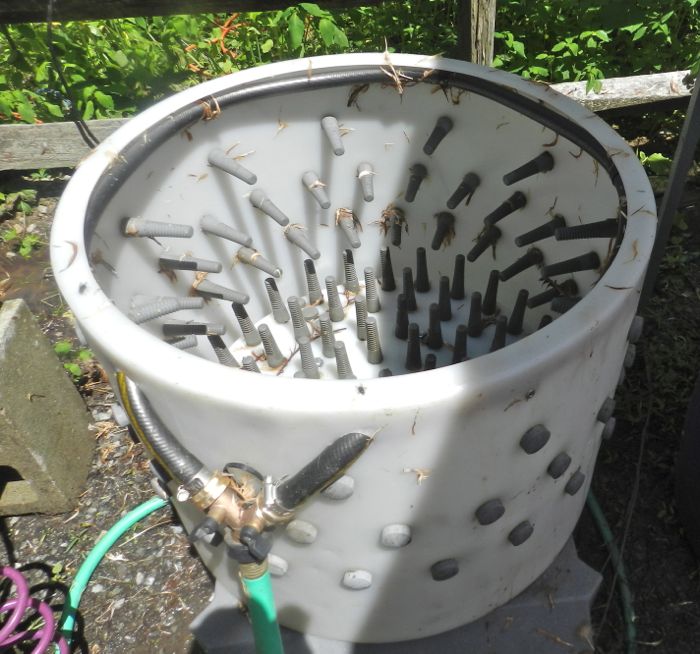
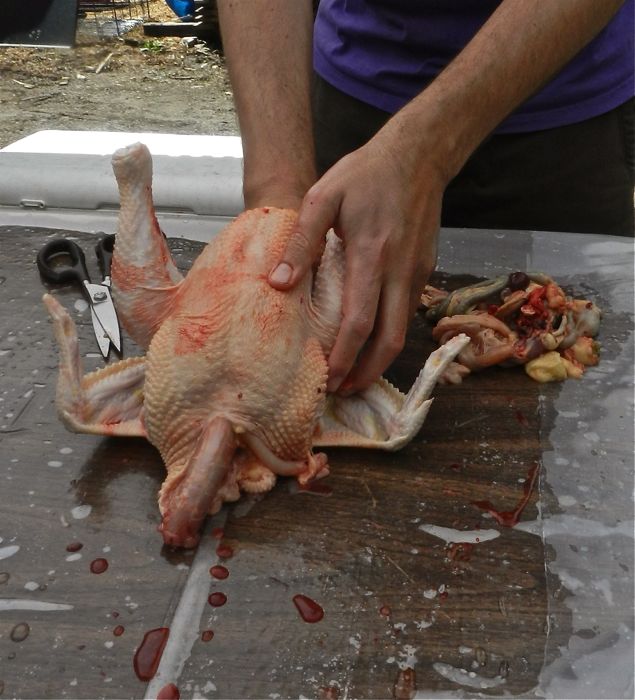

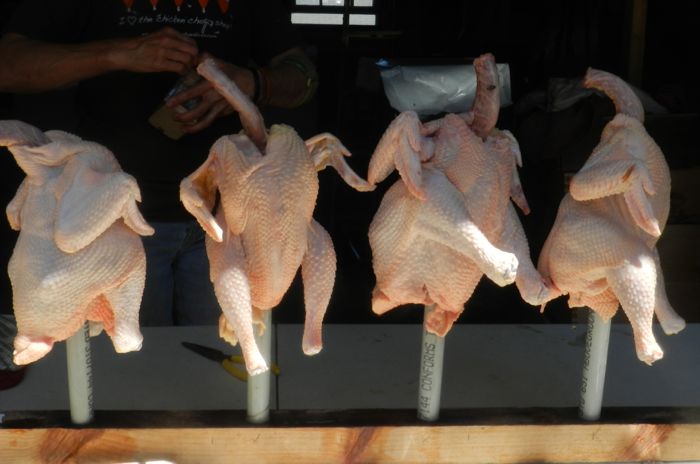


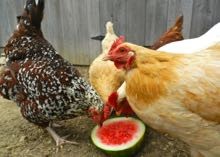
Good for you Terry! Like you I think the extra is well worth the price.
There is a local guy that raises pasture broilers not far from me. I find them much better. The meat tastes better and for me is not as “watery” as the industrial raised bird.
The main conern for my source is the local health department. They just keep hounding the poor guy over “health issues”. He is getting very frustrated and has stated he may stop raising them as the hassles are driving up his costs and getting on his nerves.
“Big Brother” just needs to let the consumer make that choice and stay out of our lives.
I’ve been a vegetarian since 2007 when I discovered the horrific reality of factory farms. Recently, my family and I have moved to an area that has many local farmers and we are slowly venturing back into the market of buying meat. I strongly believe that every time you spend money, you are voting. I vote for the local farmers that respect the land, the animals, and the consumers.
Thanks for your post. :)
I had also virtually stopped eating supermarket meat and poultry because of the horrific conditions these poor animals were raised and slaughtered in. Thankfully I live in the Willamette Valley of Oregon and we have an ever increasing number of small farms raising meat that is sold in our Co-Ops and at our Farmers Markets. After 6 years of no beef I purchased some ground beef at a harvest sale and was astounded by the quality and flavor of the product. I now budget for the pasture raised meat and poultry, and use it more like a condiment than the star of the meal. If we don’t support these young farmers how will we ever right our food system in America?
I’ll be making broth out of the carcasses to get more for my $!
Thanks Terry! We are not in a position financially right now to buy all our meat for the family from sustainable sources, but we are working on it. Each year we increase the amount we buy from local farmers and ranchers. We have also slaughtered a couple of roosters that we got from the 99% sexed chicks.
It is good to eat what you have raised and grown yourself!
It is more expensive and I’ve not bought it at times when it was beyond our budget. We eat less meat and I use recipes that use less meat per portion – but what we eat is so much better. I’ve yet to slaughter my own (have so far been able to place those roos) so I’m impressed that you did.
I really wish I could afford local meats. I eat chicken nearly every day, so it’s just not do-able. I applaud those of you who do though!
Excellent post Terry! With photos. I almost dreaded reading it, because i feel like I SHOULD be a vegetarian, yet I know my family would balk. You make a lot of sense here, and the local farm is so much more ‘humanistic’ then the huge killing fields/warehouses for chicken. Thanks for the thought FULL and thought provoking comments.
I was wondering what breed are they ? Are they freerangers ?
I have been buying local meat (chicken, pork and beef) for several years now. As you, we eat less meat of finer quality. I am always stunned by the work and care that goes into local meats. It can be hard on the budget but I would rather cut in other areas to make room for humanely treated animals. I have not yet summoned the courage to volunteer for processing day, but I am working on it.
The flavor of this meat is magnificent. I also keep my chicken carcasses for stock and what a difference they make. You get that wonderful gelatinous stock that let’s you know you got it right. I hope one day that Black Brook Farm will be able to sell lamb in smaller quantities than a half animal as I just don’t have the freezer space to accommodate that much at once. Thanks for letting us know about them.
Glad to be a vegetarian!
HOW does that plucking machine work? I kept staring at that picture…I can’t even begin to picture it working!
About factory farming, I like this quote by Lame Deer: “Having to spend all their lives stooped over makes an unnatural, crazy, no-good bird. It also makes unnatural, no-good human beings.”
I think Americans eat too much meat, and it makes it harder for people to get used to healthier, low-fat diets. And there’s plenty of good vegan & vegetarian recipes. It’s good to have meat from animals that were living a good life. That’s the reason why I’m interested in fishing: fun, relaxation + fresh, wild meat (with any kind of luck!)
Thank you so much for your thoughtful contribution. I couldn’t agree with you more!